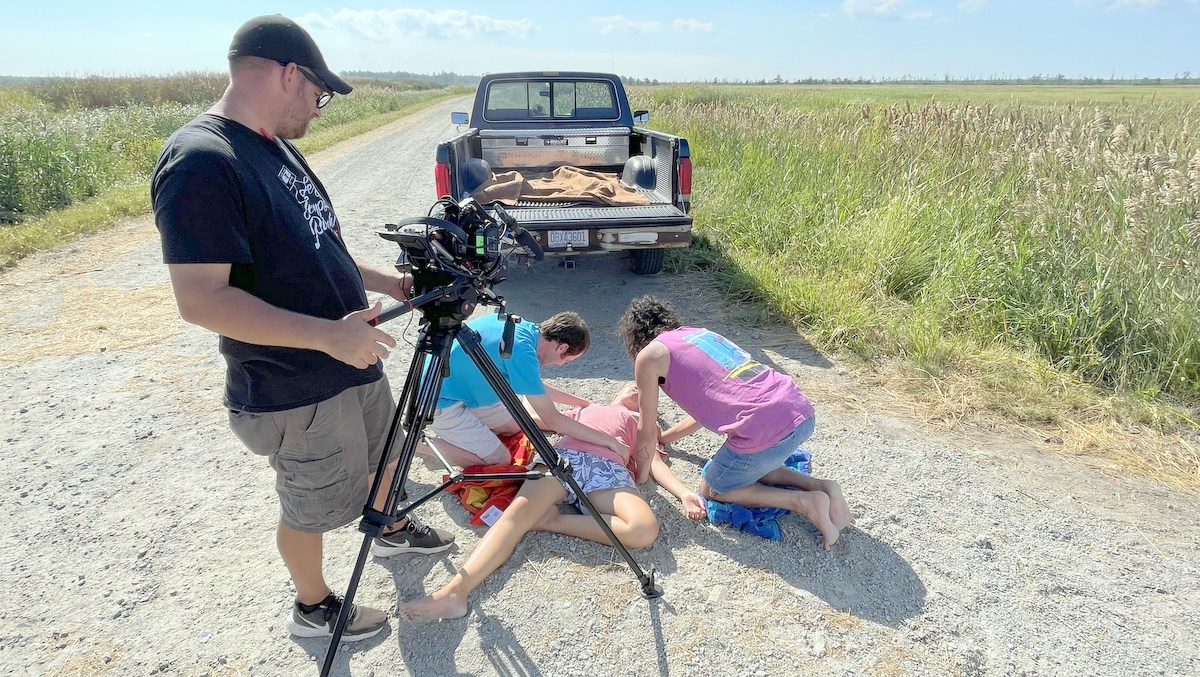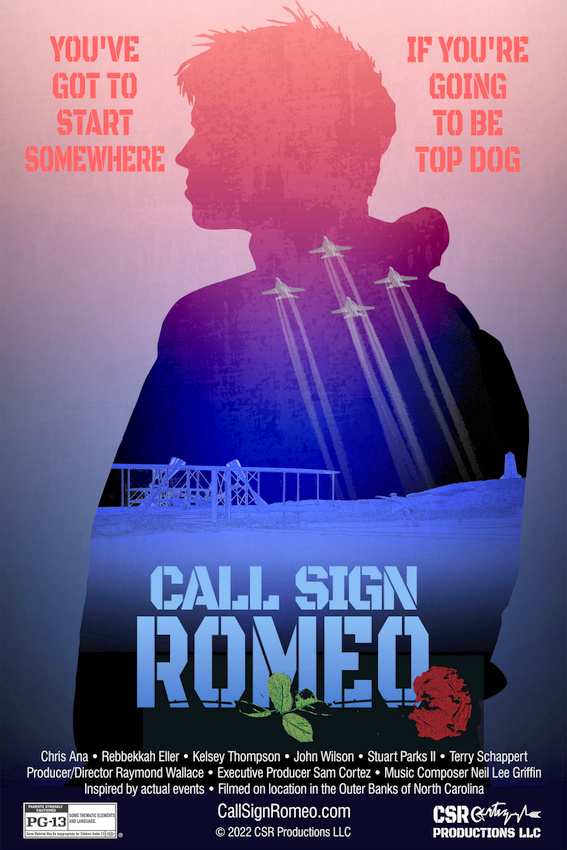
Nestled among the picturesque foothills of the Blue Ridge Mountains in Virginia, my childhood was imbued with an unwavering passion for the art of filmmaking. From an early age, I recognized the calling that beckoned me towards the silver screen. After completing high school, I embarked on a transformative journey to Maine. Where I pursued my studies in Video Production at the esteemed Southern Maine Technical College. Following my education, I ventured back to my hometown of Lynchburg, Virginia. Where I embraced the exhilarating realm of broadcast news at a local station.
Driven by an insatiable thirst for creative endeavors, my path meandered through diverse video production roles. Eventually leading me to the captivating shores of the Outer Banks in North Carolina—my current abode. It was here, amidst the awe-inspiring beauty of the OBX, that I truly honed my craft. I dedicated myself wholeheartedly to the art of filmmaking and video production. The transition proved to be a turning point in my journey. Galvanizing me to channel my creative energies with an unprecedented focus.
As I delved deeper into my work, my dedication bore fruit. In the form of numerous accolades from esteemed film festivals. Yet, perhaps more significantly, my time in the industry gifted me with invaluable collaborations alongside remarkably gifted individuals. Together, we breathed life into an array of visionary projects. We harness our collective talents to create meaningful and captivating cinematic experiences.
The Official Trailer for Call Sign Romeo Directed by Raymond Wallace
indieactivity: How would you describe your work as a director?
Raymond Wallace (RW): I would describe my work as a director as a continuous work in progress. I keep finding that there’s a lot I still need to learn and work on. However it is in that work that I truly find my inner joy. As an indie director a lot falls on my shoulders. I find myself not only serving as the director, but doing the job of DP. A costumer, catering, set builder, etc., all to bring the greater vision to life.
How did you get into directing? [what moment in your past caused you to decide to become a director?
Raymond Wallace (RW): The moment I knew I wanted to make movies is etched vividly in my memory. It happened during a day care sleepover when I was around 6 or 7 years old. On the television screen, a behind-the-scenes featurette showcased the making of “Indiana Jones and The Lost Crusade.” I watched in awe as a man, Steven Spielberg to be precise, directed the placement of tanks in a thrilling chase scene, guided actors on their reactions, and orchestrated the camera angles with an infectious smile on his face.
In that instant, a revelation struck me. I saw the sheer joy that Spielberg emanated from the filmmaking process—a joy that mirrored my own when I played with action figures or toy cars, creating scenes and stories in my mind. I would repeat those scenes over and over until they matched the vision in my mind’s eye. Since that fateful day, I’ve been tirelessly pursuing the opportunity to translate stories into reality, synchronized with the images dancing within my imagination.

How do you choose a project to direct?
Raymond Wallace (RW): Embarking on an exploratory journey, I’ve embraced a multitude of stories that have crossed my path. This period of experimentation has proven invaluable in uncovering my own distinct voice and identifying the narratives that ignite a true passion within me. With each endeavor, my focus has gradually sharpened, honing in on the stories that ignite an exhilarating spark within my imagination.
There’s an unparalleled thrill when I come across a script that instantly conjures vivid scenes within my mind. The camera angles, the interplay of light and shadow, the seamless cuts, the actors stepping into their roles—I can envision it all. It is in these magical moments that I’m unequivocally drawn to a project, knowing with unwavering certainty that I must be a part of bringing that story to life.
What uniqueness can female directors bring to film/tv/cinema?
Raymond Wallace (RW): I’m unqualified to remark on this subject. My only comment would be that anyone and everyone should have the opportunity to tell the stories that matter to them.
Why would you choose an actor, writer, or producer? What do you look for?
Raymond Wallace (RW): In the realm of creative collaboration, I strive to forge connections with individuals who possess strengths that complement my own, be it as an actor, writer, or producer. I have come to realize that when working on a project that truly ignites my passion, it is crucial to surround myself with like-minded individuals who share the same level of dedication. While this pursuit can be challenging, especially when operating within the independent production sphere, it remains essential to seek out those who can contribute their expertise and unwavering passion to the project at hand.

When you are offered a project, what things do you put in place to deliver a good job?
Raymond Wallace (RW): Whenever a project comes my way, my instinct is to deconstruct it into elements that resonate with me on a personal level. It begins with the story itself—ensuring that it captivates my interest and is worth the investment of my time and energy. Once I connect with the narrative, I delve into the visual aspect, exploring how I can push myself creatively and craft visually stunning and innovative scenes.
Building a strong and dedicated team is paramount at this stage. I understand the significance of surrounding myself with individuals who can contribute their expertise, collaborate on realizing the vision, and persistently work towards achieving the desired outcome. By assembling a team that shares the same passion and commitment, we can embark on the journey together, ensuring that the project reaches its fullest potential.
Briefly explain your latest work?
Raymond Wallace (RW): My latest project, titled “THE SIGNAL – CASE #CE2-09031996-252,” is a deeply personal and thought-provoking slow-burn sci-fi endeavor. Currently, it is making its way through the festival circuit, captivating audiences with its enigmatic storyline. The film centers around two men who become entangled in an intricate web of mystery and intrigue. Following a peculiar otherworldly encounter that tragically claims the life of their friend and sister, they find themselves subjected to relentless interrogation by a mysterious man in black.
Explain key challenges on your last film?
Raymond Wallace (RW): The project presented an array of challenges, primarily centered around venturing into unfamiliar territory and pushing the boundaries of my creative comfort zone. As I set my sights on the next ambitious endeavor, which builds upon the foundations laid by “The Signal – Case…,” I recognized the need to construct versatile sets that can be easily relocated, complete with specialized lighting and camera rigs.
“The Signal – Case…” served as a valuable exercise in understanding the costs and resources required for such a production. It allowed me to assess which aspects of the project would necessitate additional support, identify the equipment essential for bringing my vision to life, scout suitable spaces that can accommodate our set requirements, all while adhering to the limitations of a modest budget. The unique challenges I encountered revolved around finding the optimal approaches and techniques that best aligned with my artistic vision, ensuring a harmonious fusion of creativity and practicality.
What ‘thing/situation’ helps you during production?
Raymond Wallace (RW): One of the most influential factors in any production is fostering a positive morale on set. Approaching the project with an energetic and optimistic attitude can have a transformative effect on the entire team. By actively working to cultivate positivity among the crew, remarkable achievements become attainable.
When individuals come together with a shared sense of enthusiasm, a supportive environment is created, encouraging collaboration, creativity, and resilience. The power of positivity can inspire and motivate team members to overcome challenges, think outside the box, and strive for excellence in their respective roles. It establishes a foundation of trust, open communication, and camaraderie, allowing everyone to bring their best selves to the project.
By cultivating a positive atmosphere, the team can overcome obstacles, navigate through the complexities of production, and accomplish remarkable feats that may have initially seemed insurmountable. Ultimately, fostering a positive morale becomes the catalyst for unlocking the full potential of the entire production team.
Explain a creative choice you took on the set of a recent production?
Raymond Wallace (RW): During the filming of “The Signal – Case…,” I had meticulously planned multiple camera angles and movements for the interrogation scene. However, when capturing a particular actor’s performance in a Medium Close-up shot, something extraordinary happened. His portrayal was so captivating, so deeply engaging, that I realized it would be a disservice to the narrative to interrupt it with superfluous camera movements that were primarily intended to pique the visual interest of the audience.
In that transformative moment, I made the decision to abandon the additional shots and wholeheartedly focus on the actor’s mesmerizing performance. It became evident that it was his nuanced portrayal that truly conveyed the essence of the story. By relinquishing the intricate camera movements, the spotlight remained on the power and authenticity of his acting, allowing it to become the driving force behind the storytelling.
This realization reaffirmed the notion that filmmaking is ultimately about capturing and expressing the raw emotion and storytelling prowess of the performers. It served as a reminder that sometimes, simplicity can be the most impactful choice, emphasizing the strength of a remarkable performance over elaborate visual maneuvers.
How do you advise directors to find projects?
Raymond Wallace (RW): Staying open to learning about the stories of others is a valuable approach, as it allows you to explore narratives that deeply resonate with your own creative aspirations. By immersing yourself in diverse tales, you can uncover those that elicit an undeniable sense of inspiration, igniting a passion within you that screams, “I have to bring this story to life.”
Remaining receptive to different perspectives and experiences expands your creative horizons, enabling you to discover new narratives that may strike a profound chord within you. Embrace the process of exploration, actively seeking out stories that captivate your imagination and evoke a strong desire to transform them into cinematic realities. It is through this ongoing journey of discovery that you can find projects that truly ignite your creative fire and compel you to dedicate your time and energy to their realization.
How can filmmakers finance their projects?
Raymond Wallace (RW): When you find the trick to financing film projects please let me know. Save for the film “Call Sign Romeo” which was brought to me already financed, I’ve self financed all of my own projects through busting my ass with side hustles.
What do you want from an actor during a production?
Raymond Wallace (RW): I value actors who come prepared and fully embody their characters. As a director, my approach centers on allowing actors the creative freedom to bring their own understanding and interpretation to their roles. I trust in their expertise and rely on their ability to portray the character authentically.
While discussions about the character’s background, motivations, and desires occur before filming, I prefer to give actors space to showcase their skills and bring the character to life. My belief is that the most critical aspect behind the camera is capturing the genuine interaction and chemistry that unfolds on the screen.
However, when specific intentions or nuances are essential to the scene, I will collaborate with actors, providing guidance and working together to achieve the desired outcome. This balance between giving actors creative freedom and providing necessary direction ensures a collaborative approach that brings out the best in both the actors and the overall storytelling.
By prioritizing the believable and engaging on-screen interactions, I strive to create an immersive experience that captivates the audience and resonates with them emotionally.
How do you prefer to work with a producer during a production?
Raymond Wallace (RW): Collaborating with a producer during a production is something I wholeheartedly embrace. I truly value any assistance that can alleviate some of the burdens and responsibilities, as it brings a sense of upliftment to the project. However, it is crucial that we share a common vision and understanding of the project to ensure seamless teamwork and harmony.
What do you think a female director can do to get into the film industry?
Raymond Wallace (RW): I’m unqualified to answer this.
Who is your favorite director?
Raymond Wallace (RW): While it’s difficult for me to pinpoint a single favorite director, I draw inspiration from a diverse range of filmmakers who have made a significant impact on the industry. Figures such as George Romero, Steven Spielberg, David Lynch, James Cameron, Peter Jackson, Vince Gilligan, and countless others have left their indelible mark on the world of cinema. Each of these talented individuals has contributed their unique vision and storytelling prowess, and I find inspiration in their works as I continue to explore my own creative journey
Why?
Raymond Wallace (RW): One aspect that truly inspires me about the filmmakers I mentioned is their humble beginnings and how they forged remarkable careers by staying true to their creative visions. They started from modest origins, and through their unwavering passion, they were able to bring stories to life that deeply interested and resonated with them.
Their journeys serve as a testament to the power of dedication, perseverance, and the pursuit of one’s artistic passions. These filmmakers have proven that with determination and a clear vision, it is possible to carve out a fulfilling career, telling stories that genuinely ignite their own passion and captivate audiences worldwide.
Their stories remind me that the path to success in the film industry may be challenging, but it is not impossible. It encourages me to stay committed to my own creative aspirations, to nurture my own unique voice, and to fearlessly pursue the stories that truly resonate with me. Their examples serve as a constant source of inspiration as I navigate my own creative journey, reminding me that with passion and perseverance, remarkable achievements are within reach.
What advice would you give male/female directors around the world?
Raymond Wallace (RW): As a director, one valuable piece of advice I can offer is to embrace the word “No.” It’s essential to develop a comfort level with both hearing and saying this word, as it empowers you to find alternative solutions and establish clear boundaries to achieve your desired goals.
Being receptive to “No” allows you to approach challenges with a flexible mindset. Instead of viewing it as a roadblock, consider it an opportunity to explore different avenues and creative options. Embracing this mindset encourages innovative problem-solving and can lead to unexpected and rewarding outcomes.
Equally important is being able to assertively say “No” and set clear boundaries when necessary. Establishing boundaries helps maintain creative control and ensures that your artistic vision remains intact. By communicating your limitations and priorities, you foster a respectful and productive working environment, where everyone involved understands and respects the parameters of the project.
By becoming comfortable with the word “No,” both in hearing and saying it, you empower yourself to navigate challenges, explore new possibilities, and safeguard the integrity of your artistic vision.
Briefly write about your career?
Raymond Wallace (RW): With nearly two decades of professional experience, I have garnered recognition as an award-winning video producer, director, writer, and cinematographer. Throughout my career, I have worked across diverse sectors, including live broadcast news, commercial, corporate, industrial, government, education, and independent film productions.
My portfolio showcases a wide range of film projects that highlight my skills and expertise. To explore my work further, I invite you to visit my website at www.rayolightproductions.com. There, you will find a collection of my film projects, providing a glimpse into my creative approach and the quality of work I strive to deliver.
I am proud of my accomplishments and the extensive experience I have gained in various areas of video production. I continue to evolve as a filmmaker, embracing new challenges and seeking opportunities to bring compelling stories to life through the lens of my camera.
Tell us what you think of the interview with Raymond Wallace. What do you think of it? What ideas did you get? Do you have any suggestions? Or did it help you? Let’s have your comments below and/or on Facebook or join me on Twitter.
Socials
Website
IMDb
LinkedIn
MORE STORIES FOR YOU
Livestreams with Grandmapuzzles by Emily Sheskin to Screen at CIFF
CIFF Selected Documentary About Twitch Streaming Jigsaw Puzzler
VisionRey Snags Acceptance for 2 Films at FilmApalooza
VisionRey is a Mexican-American Female-Led Film Company
Pomegranate by Weam Namou: on VOD Platforms and DVD on March 4
Freestyle Acquires Dramedy “Pomegranate” for March Release
Into The Spotlight by Thaddeus D. Matula: on VOD and DVD February 21
Freestyle Acquires Doc “Into the Spotlight”
Stonestreet Studios Celebrates 34 Years of Trailblazing Filmmaking
Stonestreet Celebrates Unique Screen Acting & Production Residency Program
The Pearl Comb by Ali Cook: Mythic Historical Drama to Screen at CIFF
CIFF Selected Mythic Historical Drama from Ali Cook









